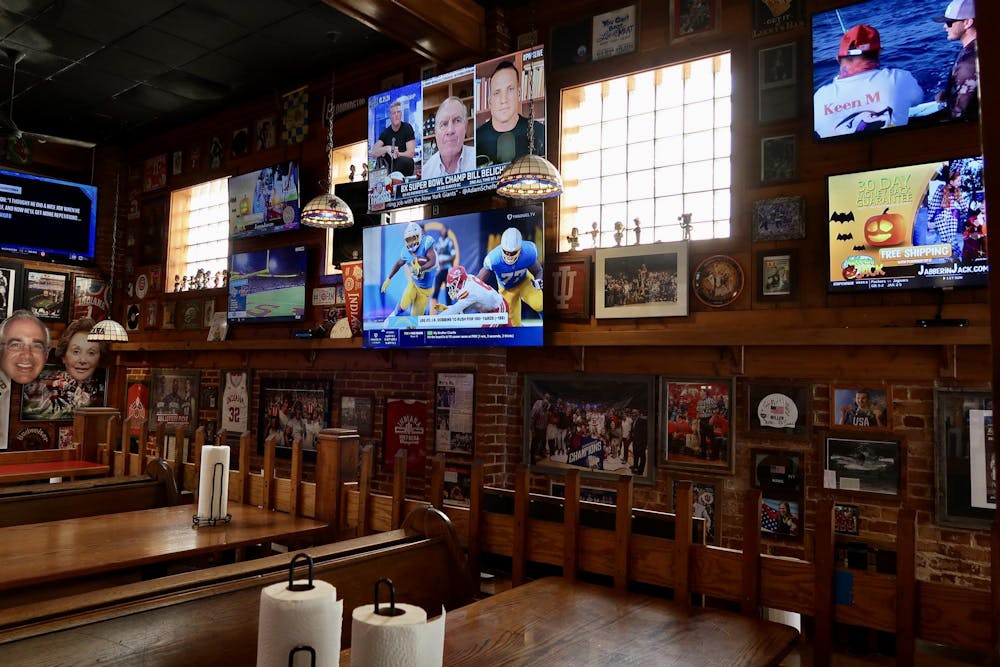The City of Bloomington will require closed captions on public televisions that have the option available starting Jan. 1, 2025.
Ordinance 2.23.240 will mandate closed captions on television screens during regular operating hours. One in five television screens showing the same program must have closed captions visible. However, if a television does not support closed captions, the ordinance does not require the purchase of one that does.
An informational brochure produced by the city says the ordinance applies to “places of public accommodation” including but not limited to restaurants, bars, gyms, stores and waiting rooms.
Michael Shermis is the director of the Bloomington and Monroe County Human Rights Commission. He worked with Holly Elkins, chair of the Indiana Association of the Deaf’s legislative committee, to guide the ordinance into law.
Shermis said Elkins approached his office with the idea for the ordinance a year ago. Though Elkins and the IAD hope to see a similar ordinance pass nationally someday, they wanted to start on the progress locally first.
“Bloomington is our first stop,” Shermis told the Indiana Daily Student. “No surprise, because it’s a fairly progressive community.”
One question that arose during the drafting process was how the ordinance would be enforced. Shermis said the city isn’t able to fine any violators but will take complaints from the public.
“A lot of people (may) ignore that law because it doesn’t have too much bite,” Shermis said. “The intent is to try to get them to take that seriously.”
The Bloomington Council for Community Accessibility plans to award door decals to businesses who pass an accessibility survey through its AccessAbility decal program. These places will be publicized on the city's website.
Customers and visitors can report a violation of the ordinance after Jan. 1, 2025, by filing an Americans with Disabilities Act complaint.
“Usually just a call from me to a restaurant or something like that can make the difference,” Shermis said.
Elkins said the ordinance will help not only deaf people, but also people who are learning English.
“It offers improved literacy and language acquisition skills,” Elkins said in an email to the IDS. “Captions assist people with new vocabulary acquisition and reading comprehension.”
A recent study from the University of Maryland supports this claim. Researchers found that captions can help English learners understand the language better, especially when speakers are talking fast.
Elkins pointed out that deaf people aren’t the only ones who use this technology. She said that Gen Z and Millennials have helped normalize caption usage, citing a YPulse Global Report.
While the ordinance helps other groups, it means something special to Elkins in particular. She was born deaf to a hearing family in Bloomington.
“The Deaf community is closely knit and united in which we all share a common denominator: encountering the myriad challenges and barriers within schools, workplaces, and communities in our daily lives,” she wrote.
Closed captions do more than help her understand what she can’t hear.
“It unites families, caregivers, and friends in sharing laughter, shock, sadness, and joy when watching a particular movie or show,” Elkins wrote.
All public and private schools in Bloomington, including Indiana University, are included under the ordinance. Debbie Gessinger, who teaches American Sign Language at IU, considers the ordinance a step forward in accessibility.
“It’s a big YES!” Gessinger wrote in an email to the IDS. “Deaf people should have the same access as hearing people. It is important for everyone to be familiar with the Americans with Disabilities Act, which emphasizes the need for full accessibility for individuals with disabilities.”
CORRECTION: This story has been updated to reflect the Bloomington Council for Community Accessibility will award decals to businesses through its AccessAbility decal program.




